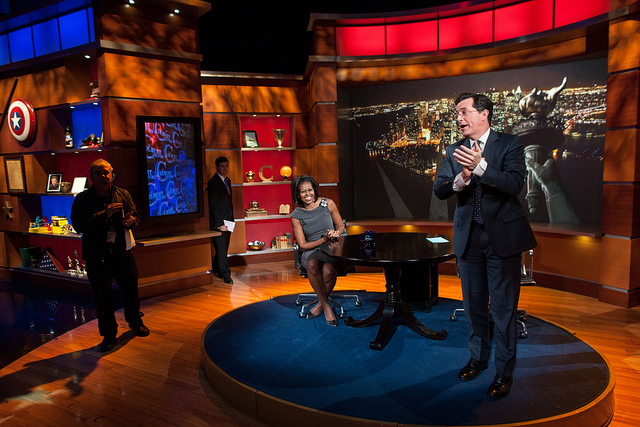It’s not every day that a Heritage scholar offers to help comedian Stephen Colbert make sense of how Christians, especially young evangelicals, can apply biblical principles to politics in our pluralist culture. But it’s good to share the burden of a neighbor — even one so “befuddled” as Colbert — Jennifer Marshall writes in her provocative essay, “The Christian Calling to Citizenship.”
Marshall makes the case that faithful Christians need not desert the public square because it is noisy and rancorous:
Politics isn’t just election season and what happens in Congress. It’s not primarily about the endless debate on Fox News or MSNBC. Politics is about the way we order our lives together … Politics is the way we figure out how to meet everyday needs, solve problems, and sort out our differences. It’s about harmonizing diverse interests and building consensus about what’s worth pursuing as a society. We work out issues in all kinds of forums — from family room to boardroom to congressional hearing room …
The essay by Marshall, director of Heritage’s DeVos Center for Religion and Civil Society, appears as a guest post for a series on “Christians and Political Engagement” in the blog of The Gospel Coalition, a fellowship of evangelical churches whose concerns include “the unchallenged acceptance of theological and moral relativism.” The timeliness of her topic for thoughtful weekend reading is illustrated by three stories in the news:
In Washington, DC, pastors on both sides of the marriage debate have stepped up to defend Gallaudet University’s chief diversity officer, who was suspended for signing a petition at church for Maryland’s same-sex marriage law to be placed on the ballot.
In Oklahoma, David Green’s family business, Hobby Lobby, has sued the federal government over the Obamacare mandate requiring the 514-store chain provide “free” abortion drugs and contraceptives in health plans for its 20,000 employees or face huge fines — despite the Green family’s objections on religious grounds.
And across America, many are registering their disapproval of a campaign ad for President Obama, aimed at college students, that equates voting for him to losing their virginity to “a great guy.”
What these events have in common is that they include Christians who aren’t afraid of civic engagement. As Marshall writes:
Sitting on the sidelines is not an option. Some are called to public policy; some have an avocational passion for politics proper. But all are called to basic stewardship of the gift of political freedom and the goal of true human flourishing.
So what’s this about giving Colbert a clue? Marshall notes that in a recent interview on NPR’s “Fresh Air,” the crown prince of Comedy Central “professed perplexity that evangelical Christians ‘have to base all [their] political decisions on absolute biblical truths that must not be denied’ in a political arena where such truths often are denied.”
Marshall unfolds an argument that should prove enlightening not only to the Roman Catholic satirist but young evangelicals and others who see broken relationships all around them and wonder what God’s got to do with it. She has encouraging words:
Everyone brings fundamental assumptions to public discourse, whether they call those commitments ‘religious’ or not. Voting is an exercise in expressing a worldview. Every public policy expresses a moral judgment about what is good, from seat belt laws to tax reform to the definition of marriage.
You can read Jennifer Marshall’s full essay here. A useful resource for putting these principles into action is Seek Social Justice, a DVD for small group study developed by Heritage.
Source material can be found at this site.










